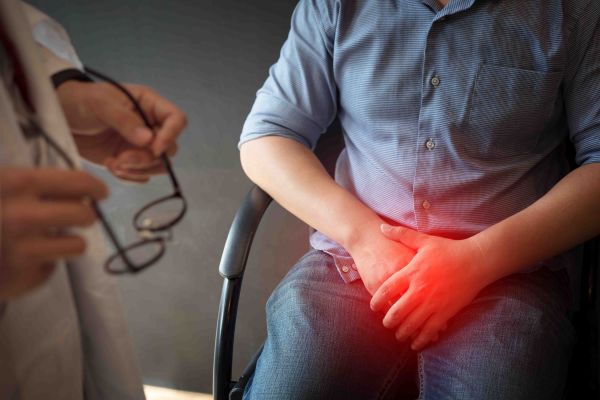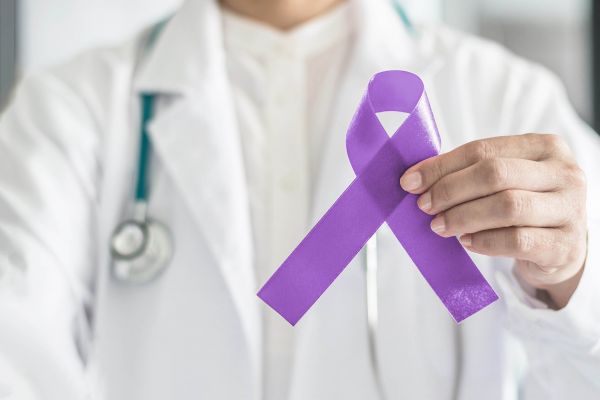Testicular cancer occurs when cells in one or both of the testicles begin to grow erratically and become malignant. While testicular cancer can affect males of any age, it is most frequently diagnosed in young men ages 15 to 30 and is far less common among males over age 50. About one of every 250 males will develop testicular cancer at some point during their lifetime. When found early, it responds very well to treatment and is highly curable.
Testicular cancer self-exam
Self-examination is key to diagnosing testicular cancer early. Roswell Park Comprehensive Cancer Center recommends that males between the ages of 15 and 50 do a testicular self-exam at home at least once a month. Doing self-checks regularly makes you more inclined to notice a change.
A self-exam is easy and takes just a few minutes. You can learn here how to check for testicular cancer at home. Any hard lump on or in the testicle deserves a visit to the doctor. The lump could be as small as a pea or as big as an apple and is usually painless.
Also contact your doctor if you feel a change in a testicle. The sooner the better. A small testis tumor has a better prognosis than a large testis tumor. Testicular cancer is one of the few cancers that — with almost all patients — we can cure the patient, even if they present with metastatic disease or stage 4 testis cancer.
Testicular cancer grows very rapidly. There are different types, and they are best treated with chemotherapy or radiation therapy, depending on the type. If you don’t have a family physician, you can call Roswell Park and be seen by one of our doctors.
How do you get testicular cancer?
Having a risk factor does not mean you will develop testicular cancer. Risk factors for testicular cancer include:
- An undescended testicle (cryptorchidism) or an inguinal hernia at birth
- Testicles that did not develop normally
- Previous testicular cancer. About 3-4% of men successfully treated for testicular cancer will develop cancer in the other testicle.
- Carcinoma in situ of the testicle
- An HIV infection
- A family history of testicular cancer, especially in a brother or father
- Testicular microlithiasis, an uncommon condition in which small clusters of calcium form in the testicles
Other risk factors are your race — white men are four to five times more likely to develop testicular cancer than Black or Asian American men — and your age: testicular cancer is most prevalent in men between the ages of 15 and 30, followed by those between 40 and 50 years old.
Warning signs of testicular cancer
Testicular cancer pain can vary and usually feels more like an ache than a sharp pain. You should contact your doctor if you experience any of the following:
- Swelling, pain or discomfort in the scrotum
- A lump or swelling in either testicle, usually painless
- Pain or discomfort in a testicle
- A change in how a testicle feels
- A dull ache or heaviness in your lower abdomen or groin
A sharp pain in a testicle that lasts more than a few hours may be an indication of testicular torsion, which occurs when a testicle rotates, twisting the spermatic cord that brings blood to the scrotum. The reduced blood flow causes sudden and often severe pain and swelling. Although not related to cancer, it is an emergency that needs medical attention.
If you are unable to feel your testicle, it could mean you have a swelling of the scrotum known as a hydrocele. As with any sudden change, you should contact your doctor. Although not normally suggestive of cancer, a sudden onset of a hydrocele could indicate testicular cancer.
While those symptoms may mean you have cancer, other warning signs could suggest that you have cancer in a more advanced cancer stage. These include:
- Fatigue
- Significant weight loss
- An increase in the HCG hormone, which leads to painful swelling in the breast
- Shortness of breath, from testicular cancer spreading to the lungs
- A mass in the abdomen
Why Roswell Park?
At Roswell Park, our oncologists and surgeons have extensive experience diagnosing and determining the best treatment for testicular cancer.
After the testicle has been removed — during a surgical procedure called radical inguinal orchiectomy — it is very important that it be examined by a highly specialized pathologist. The testicles are made up of many types of cells, each of which can develop into one or more types of cancer. It's important to know the type of cell the cancer started in and what kind of testicular cancer it is so doctors can prescribe the chemotherapy that works best for that particular type of cancer.
If you have metastatic cancer that has spread to the lungs or lymph nodes, you will need a medical oncologist to determine the best chemotherapy treatment to properly manage your cancer. After chemotherapy, you may need surgery to remove any remaining lymph nodes that are affected. This surgery is complex, and you will want to have an experienced surgeon who performs this type of surgery on a routine basis.
Testicular cancer screening
Find out how to check yourself for teticular cancer and check your cancer risk.



